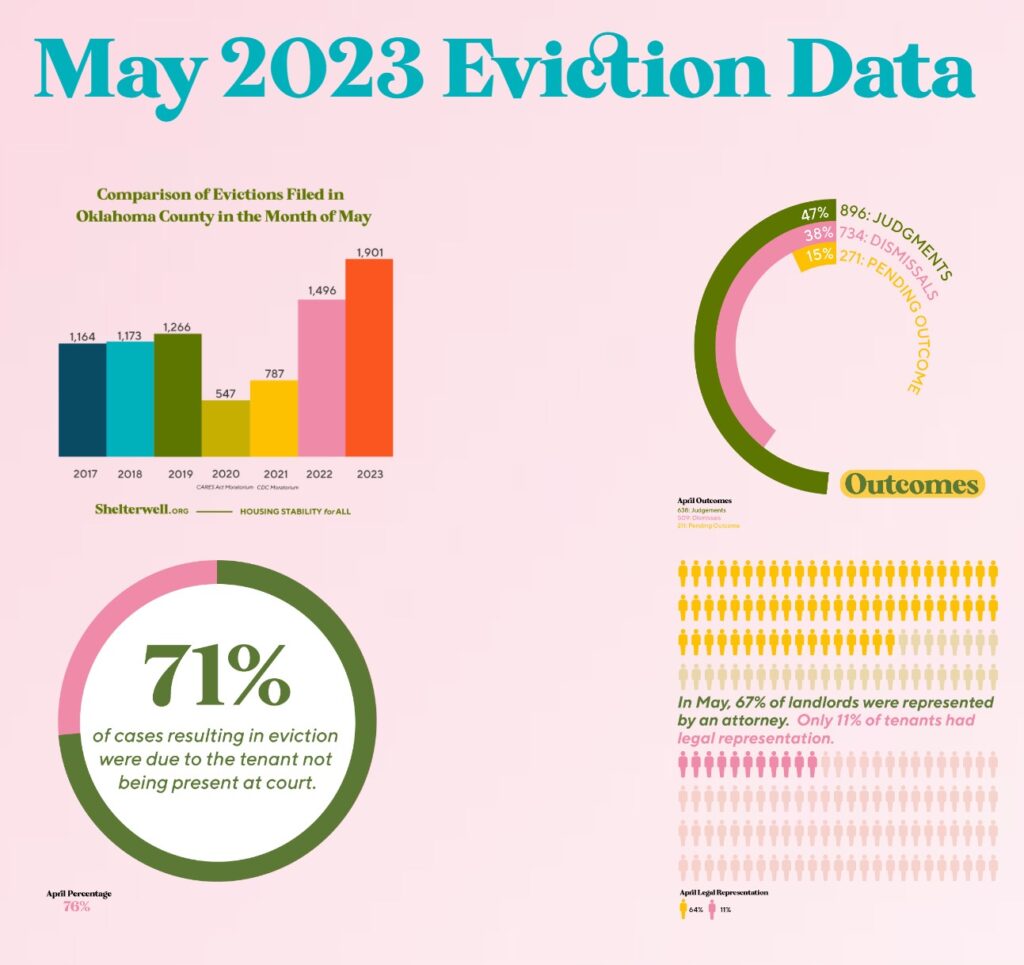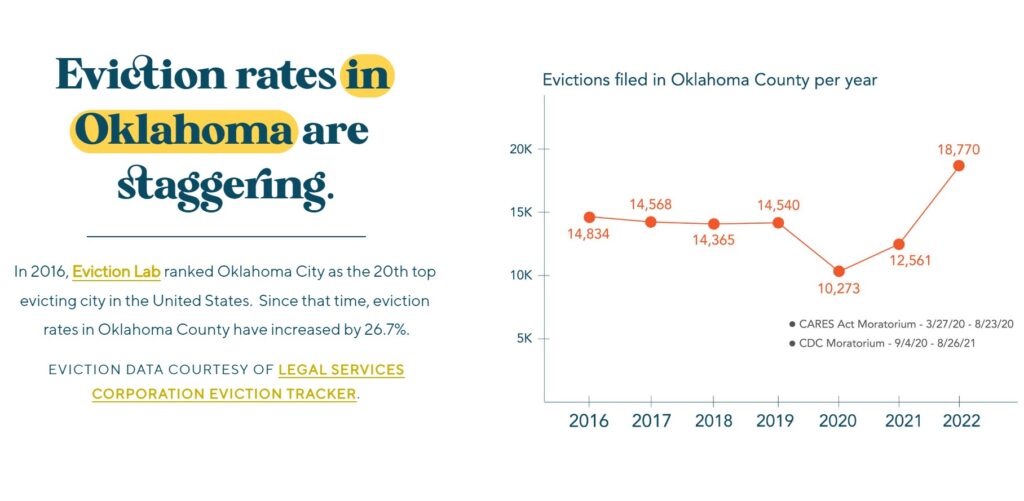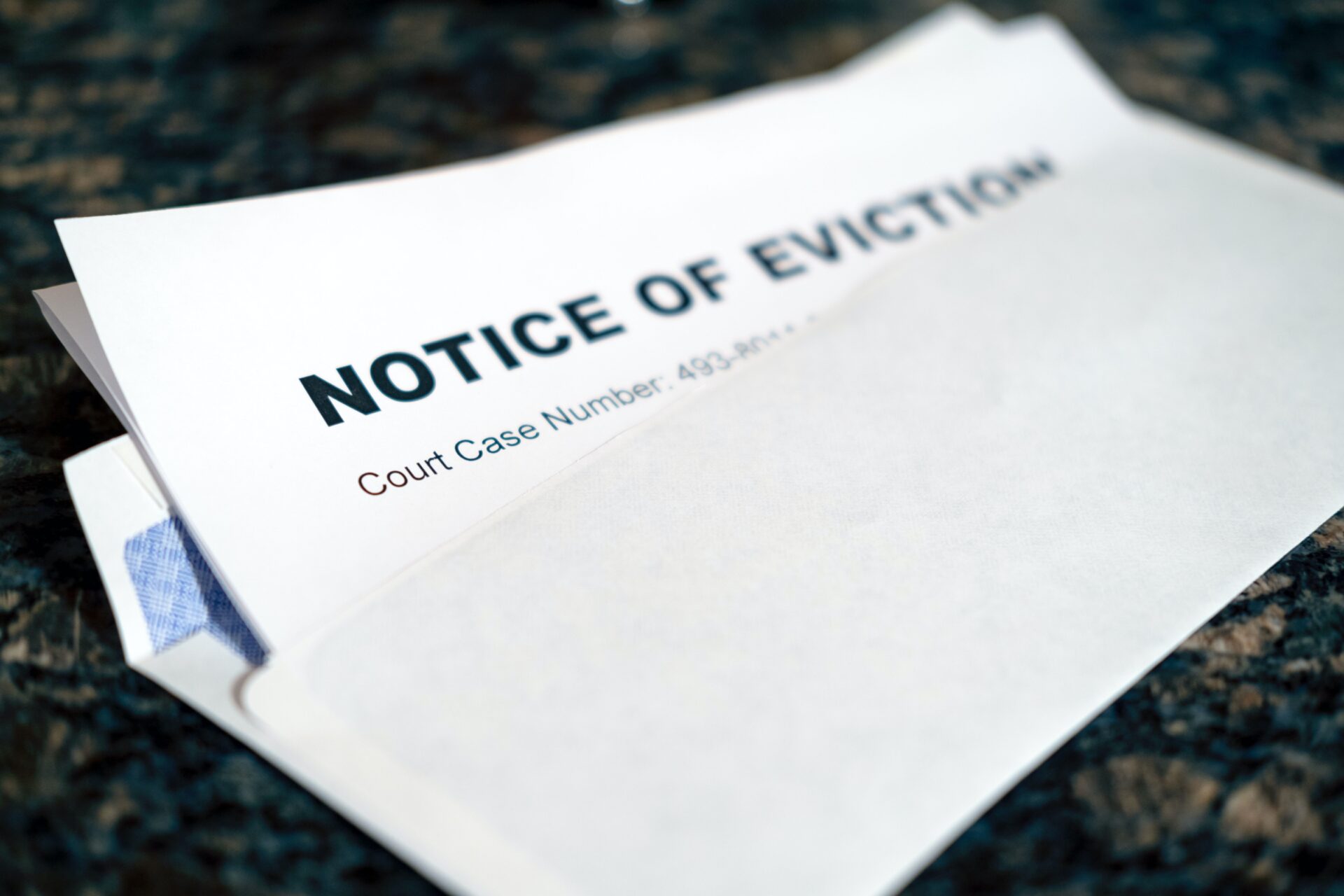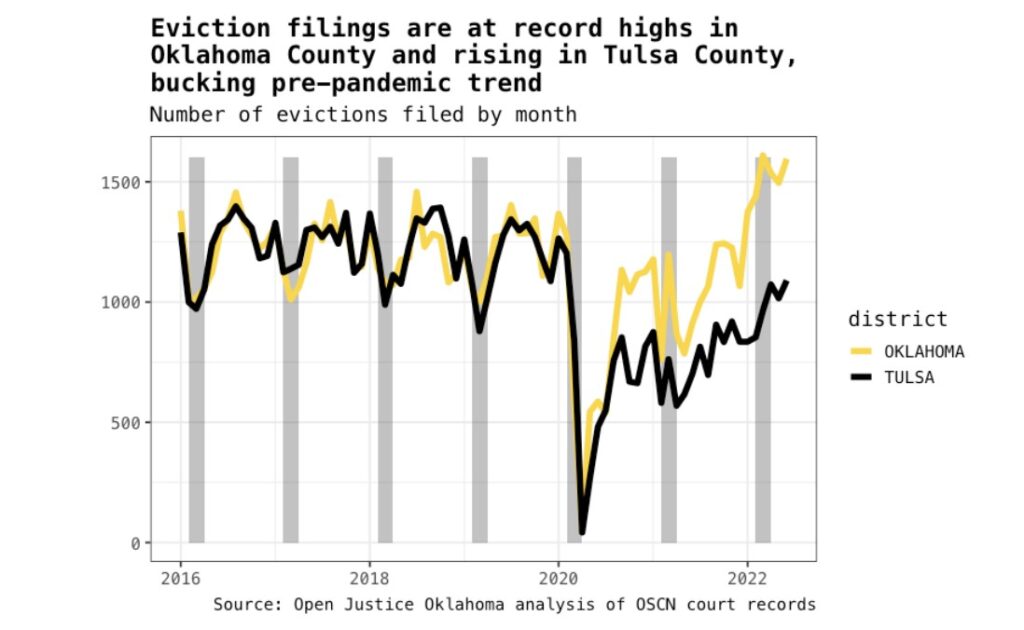Eviction in Oklahoma
For many, the term eviction may seem like a fear-filled word that suggests pictures of chaos and pain. While the outcome can often match this imagery, the entire process is even more complicated and stressful.
It is also a situation that could be mitigated in our state to the benefit of all. Oklahoma lacks many protections for landlords and renters alike, which has enticed predatory out-of-state corporations to take advantage and profit from residents. There are several groups who advocate for better housing opportunities in Oklahoma.
One such group is Shelterwell, which works on eviction education and prevention through the lens of their belief that housing is a human right. Through connecting people with resources, education, and data sharing, they are advocating and raising awareness on housing (in)stability in Oklahoma.
Work like this is crucial to improving housing in our state, and also to understanding how critical actions such as eviction occur. In understanding evictions, we can learn more about how to keep Oklahomans safely and securely housed.
A family safely housed is a family connected to hope and a way forward.

(Source: https://www.shelterwell.org/eviction-data)
What does that look like?
Eviction is the legal process that can end in the court-ordered removal of a tenant from their home or residence. Oklahoma law allows landlords to evict for nonpayment of rent, for violation of lease agreements, for criminal activity, for damage to the property, for failing to maintain utility services, or for disturbing other tenants, among other reasons.
In some states, there are protections in place for tenants and lengthy timelines along which an eviction takes place, and eviction is treated as a last case scenario. However, Oklahoma’s Landlord and Tenant Act is massively outdated. Evictions are cheap for landlords, and there are few protections in place for tenants who face homelessness at the end of an eviction proceeding. Compounded with a lack of education on the process and the law, this leads to a high number of evictions daily.

(Source: https://www.shelterwell.org/eviction-data)
In Oklahoma, an eviction notice is sent from the landlord, and the tenant is a certain number of days to repair the situation. For example, in the case of nonpayment of rent, a tenant has just five days to remedy their nonpayment. In the case of a lease violation, tenants have fifteen days to remedy the violation. Tenants can have their leases terminated and moved into eviction proceedings immediately in the case of criminal activity, harm to the rental unit or to another person on the premises, or illegal drug-related activity. In these cases, it’s not often required that a landlord have proof that a tenant actually engaged in these activities. The suspicion alone can be enough to start an eviction lawsuit.
At the end of the notice period, the landlord may proceed with an eviction lawsuit, also known as a Forcible Entry and Detainer action. Tenants may appear in court to fight their eviction using some of the limited legal defenses available to them. However, the vast majority of tenants don’t appear for their eviction court dates, and even fewer of those are represented by attorneys when they do.
For More on Eviction Court: https://www.okbar.org/barjournal/october-2022/a2j-eviction-courts/es here[/learn_more]
In court:
Shelterwell’s Director of Eviction Prevention Brad Senters, regularly attends court to gather data and aid as a mediator:
 The day of court is a daunting and nerve-wracking experience. The courtroom is packed, loud, and uninviting. The process is long and frightening. A judge will “call roll” of those on the docket that day. Then it will be up to the parties to converse and either come to an agreement or request a trial and let the judge decide. Either the tenant or the landlord can have an attorney or represent themselves. There are legal options for tenants but more often than not, a tenant with zero legal background is expected to negotiate with an experienced attorney on the other side. Should the parties not be able to reach an agreement, the case will be heard before the judge. Commonly, if the landlord has served their notices correctly and the tenant did not pay the rent within the 5 day notice, the judge doesn’t have much choice but to rule in favor of the landlord. If the landlord wins their case, the tenant generally has 48 hours to vacate. All of this happens within the span of two frantic hours, every Monday through Thursday, to around 100 of our Oklahoma County neighbors a day, often when they are already in their darkest hour.
The day of court is a daunting and nerve-wracking experience. The courtroom is packed, loud, and uninviting. The process is long and frightening. A judge will “call roll” of those on the docket that day. Then it will be up to the parties to converse and either come to an agreement or request a trial and let the judge decide. Either the tenant or the landlord can have an attorney or represent themselves. There are legal options for tenants but more often than not, a tenant with zero legal background is expected to negotiate with an experienced attorney on the other side. Should the parties not be able to reach an agreement, the case will be heard before the judge. Commonly, if the landlord has served their notices correctly and the tenant did not pay the rent within the 5 day notice, the judge doesn’t have much choice but to rule in favor of the landlord. If the landlord wins their case, the tenant generally has 48 hours to vacate. All of this happens within the span of two frantic hours, every Monday through Thursday, to around 100 of our Oklahoma County neighbors a day, often when they are already in their darkest hour.
Why is this important?
Many cases of eviction cases are an unnecessary, painful, and expensive occurrence for people. As this has shown, the process is also dehumanizing at best. Most tenants’ cases are resolved against them without their having attending court, whether for lack of knowledge or because they deem it fruitless to even try to fight for their case. However, while many might suggest that tenants who fail to pay or commit other misconduct should face consequences, the answer is not that simple. For some tenants, their paydays don’t align with when rent is due. Shelterwell’s court work included an individual in Oklahoma County who is forced to go to eviction court every month because their pay day does not align with rental due dates. The company in charge of their residence is based outside of Oklahoma, operating through an online platform; their representatives simply say that it’s “company policy” and continue to file for eviction when payments are not processed at the correct time.
(Source: https://okpolicy.org/its-time-for-action-to-address-oklahomas-eviction-crisis/)
For others, catastrophic events like health emergencies, natural disasters, or violence – or even more mundane events like the loss of a job, an unexpected missed paycheck, or an unplanned-for expense – mean that a small amount owed can snowball into a financial disaster. With many property-owning corporations being located outside of the state and payment conducted via online portals, tenants lack a human connection with the people they are paying for the privilege of a roof over their head. Some evictions come from a misunderstanding of a contract, or defunct housing that should be dealt with by the landlord but instead it becomes easier to evict a person than fix the problem. It often seems that there is either no way to rectify this or no will to try. At the end of the day, it’s not the reason why someone filed for eviction that is the real question. Our system is inequitable and takes advantage of our neighbors. The high number of evictions is because the process has ended up streamlining people’s name onto a docket and they don’t even have a chance to understand what went wrong.
At the end of the day, it’s not the reason why someone filed for eviction that is the real question. Our system is inequitable and takes advantage of our neighbors. The high number of evictions is because the process has ended up streamlining people’s name onto a docket – people who don’t even have a chance to understand what went wrong.
Oklahoma is one of the top states for eviction. It also is one of few that permits landlords to evict people for filing health or safety complaints. An eviction can stay on a person’s record for seven years, and many landlords will not accept renters with a history of eviction.
Even without the difficulties of having an eviction on record, Oklahoma currently has a gap of 81,638 rental homes or apartments of extremely low-income renters. There are only 39 houses available for every 100 households in this range.
This also does not include the other impacts that this process has on people. Eviction goes beyond the physical act of leaving a residence. People must then find somewhere else to stay, attend court, arrange for childcare, work schedules, and the following impacts can lead to negative physical and mental health outcomes.The eviction process is expensive, traumatizing, and life-long. Having an unpaid rent can damage credit scores and job opportunities. Studies have shown people with disabilities and people of color, particularly women of color are evicted at higher rates. Pregnant people who face eviction are more likely to experience birth complications and long-term health problems.Evictions do not affect all people the same, and having an eviction record can trap families in poverty and homelessness.
A collaborative analysis conducted via Harvard recently found that childhood exposure to evictions was associated with harms to neurodevelopment and overall health. This includes adverse birth effects, as well as adverse child health outcomes after. Children experience lower cognitive development, high blood pressure, depression, anxiety, and cases of suicides due to experiencing evictions. The trauma of eviction disrupts “nearly every facet of a family’s life” and can also expand to the community. Evictions are a powerful tool that impacts health issues that are only exacerbated by housing insecurity and homelessness. Given the intersectional nature of the factors that play into a lack of affordable housing and evictions data, it is also a concern of health equity.
According to the National Alliance to End Homelessness, in Oklahoma there are nearly 3, 871 people without a home on a given night. Groups like this and the Oklahoma Homeless Alliance work to move people into safe and secure housing, while also keeping up on information of those affected by a lack of housing. They cite that nearly 20% of the unhoused population in Oklahoma City are families with children. Even more people, 23%, report a mental illness.
How could we make this better?
There are better alternatives to our current process that can change everyone’s life for the better. Other states that have amended the eviction process have seen higher levels of retainment and lower evictions. By changing fees, lengthening timelines, and using court as the final option, people can better retain their homes – and landlords can retain their tenants and profit – in addition to easing the burdens on court staff. There are many options to advocate for that would make this more equitable and efficient.
Just this year, at the state level, House Bill (HB) 2792 was signed into law. This will create eviction summons (as well as other forms) in plain language that are easier to understand for tenants. Measures such as this will aid people in advocating for themselves in the process and have a better chance of success. This bill is a huge step forward; however, it is still a vastly unjust and convoluted system that traps people in debt and enforces a cycle of insecurity and potential homelessness.
There are other ways to reform the current eviction process, while protecting Oklahomans on either side of the process.
- Eviction filing fees: Currently, it costs little for landlords to file for eviction in Oklahoma. Raising the cost could help in a myriad of ways, most especially by deterring landlords from partaking in the eviction process and encouraging them instead to use communication and mediation before heading to court.
- Legal Aid Services of Oklahoma: A non-profit law firm that believes access to the legal system is “as important as food, shelter, and clothing”. They currently operate to help, for free, in eviction cases for residents in 73111 and 73119 zip codes. People outside those areas can still seek help, but it depends on the capacity of their legal staff. Efforts like these are crucial to mitigate abuses of our neighbors and help people understand their rights.
- Legislative change: Several bills were filed last session that would have increased access to protections for tenants, better habitability laws for residences and more. If this is a concern for you, contact your legislator and let them know!
While CAIR Oklahoma does not specialize in housing, it has been a big part of our policy platform this session. Access to safe, affordable housing should be seen as a priority. Our government affairs team has been working with others to help learn more and push for these efforts at our state capitol.
To find out more from those working in this fields, or if you need help related to eviction check out:



